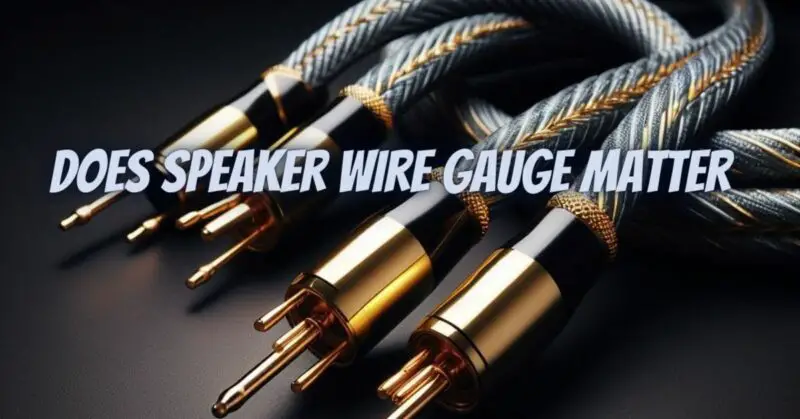When setting up a home audio system or home theater, audiophiles and enthusiasts often encounter the question: Does speaker wire gauge matter? This topic has sparked numerous debates and discussions within the audio community. In this comprehensive article, we will delve into the intricacies of speaker wire gauge, its potential impact on audio quality, and the factors that should guide your choice when selecting the right wire for your audio setup.
Understanding Speaker Wire Gauge
Speaker wire gauge refers to the thickness or diameter of the wire used to transmit electrical signals from your amplifier or receiver to your speakers. It is typically measured using the American Wire Gauge (AWG) system, with lower AWG numbers indicating thicker wire. For instance, 12 AWG wire is thicker than 16 AWG wire.
Key Considerations
Before we explore the implications of speaker wire gauge on audio quality, it is important to consider several key factors that should inform your decision:
- Resistance: One of the most crucial factors in speaker wire selection is resistance. Resistance in a wire impedes the flow of electrical current and can lead to energy loss in the form of heat. Lower resistance is generally preferable, as it allows for more efficient transmission of the audio signal.
- Length of Wire: The distance between your amplifier or receiver and your speakers significantly influences the choice of wire gauge. Longer wire runs can lead to increased resistance, which may necessitate thicker wire to minimize signal loss.
- Speaker Impedance: Consider the impedance of your speakers, which is typically measured in ohms. Lower-impedance speakers (e.g., 4 ohms) present a greater demand on the amplifier and may benefit from thicker wire to mitigate resistance.
- Power Requirements: High-powered audio systems, particularly those used in professional audio setups or large venues, often demand thicker wire to handle the higher power levels without significant signal degradation.
- Audiophile Expectations: Audiophiles, who are often discerning listeners with high-end equipment, may notice subtle improvements in sound quality with thicker speaker wire. However, these improvements may be challenging for the average listener to perceive.
Impact of Speaker Wire Gauge on Audio Quality
Now, let’s explore the potential impact of speaker wire gauge on audio quality:
- Short Distances: In most typical home audio setups with relatively short wire runs (usually under 20 feet or 6 meters), the difference in audio quality between various speaker wire gauges is often minimal and may not be discernible to the average listener. For these setups, standard 16 AWG or 14 AWG wire typically suffices.
- Longer Distances: In larger rooms or home theater environments where the wire must span longer distances, thicker wire (e.g., 12 AWG or 10 AWG) can help reduce resistance over the extended length. This can potentially preserve signal quality and ensure better audio performance.
- High-Powered Systems: High-powered audio systems, such as those used in professional audio settings or for large venues, may benefit significantly from thicker wire. Thicker wire can efficiently carry the higher power levels without significant loss or degradation.
- Audiophile Environments: Audiophiles, who often possess specialized equipment and a finely tuned ear for audio nuances, may perceive subtle improvements in sound quality with thicker speaker wire. These improvements, however, are challenging to detect for the average listener.
Practical Considerations
When selecting speaker wire gauge for your audio system, consider the following practical tips:
- Match Gauge to Requirements: Choose a speaker wire gauge that aligns with the specific demands of your setup, taking into account factors like distance, speaker impedance, and power requirements.
- Quality Matters: Invest in high-quality speaker wire that features good insulation and conductive materials. The quality of the wire can impact both long-term durability and signal quality.
- Speaker Placement and Acoustics: Ensure that your speakers are appropriately placed and that the room’s acoustics are optimized. These aspects play a more substantial role in overall audio quality than speaker wire gauge.
- Budgetary Constraints: Thicker wire typically comes at a higher cost. Evaluate your budget and priorities to strike a balance between wire thickness and other components of your audio system.
In conclusion, the importance of speaker wire gauge depends on various factors, including the characteristics of your audio setup, the impedance of your speakers, and the length of the wire runs. While thicker wire can offer advantages in specific scenarios, the differences in sound quality between various speaker wire gauges are often subtle or even negligible in most typical home audio systems. To make an informed decision, it is essential to consider your specific requirements, budget constraints, and overall priorities, keeping in mind that factors such as speaker placement and room acoustics have a more pronounced influence on audio quality. Ultimately, the right choice of speaker wire gauge should harmonize with your unique audio needs and preferences.


